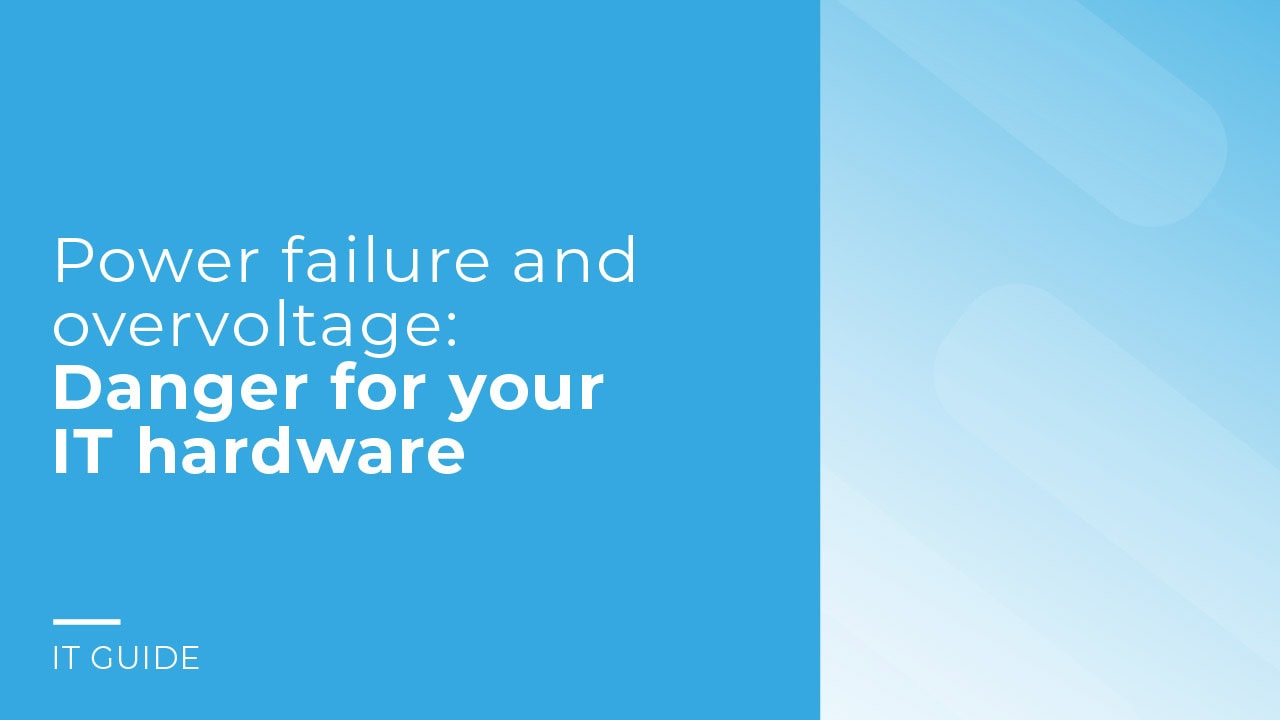
Many things are currently unthinkable without electricity. Especially in the IT sector, devices need electricity to function properly. Whether switches, servers or routers - they are only intact if they are supplied with electrical power. If only one computer in your network is affected by a power failure, the damage is relatively minor. But if an entire server room fails, the consequences are far greater.
This blog post summarizes how power failures and overvoltages and how you can protect your company against them.
A power outage is an interruption in the supply of electrical energy. Generally speaking, it is a disruption of the balance between electricity consumption and electricity generation.
This can normally be of short duration, i.e. a few seconds, minutes or hours, because extreme cases can last for several days or weeks. If it also affects many people and entire regions, it is referred to as a "blackout". The latter can have far-reaching consequences, therefore households, companies and industrial society are strongly impacted.
IT security in your company is therefore extremely important and should never be neglected.
You can find out more about IT security in companies in our article “IT Security in Companies: Importance and Solutions”.
An overvoltage is a voltage increase that lasts from a few microseconds to hours. This voltage increase exceeds the tolerance range of the permissible operating voltage.
The connected electronic components of an appliance are damaged or even destroyed. This leads to a failure, in extreme cases even to an explosion or fire of the appliance. If these also occur more frequently, they will damage the device and therefore your IT infrastructure in the long term.
Very high overvoltages are also referred to as a short circuit, in which case the system must be repaired.
Many people often think of overvoltages as direct lightning strikes or a strong electromagnetic field, which is sometimes the case. However, switching operations, i.e. manual or automatic interventions in the power transmission system, also cause disruptions in your network and downtime for your devices. Surges also occur when the load increases due to a power interruption.
There are 3 ways to protect your end devices, installations or equipment from overvoltages, depending on the type of overvoltage. Firstly, lightning current arresters protect against high-energy faults; therefore, they prevent lightning from entering your building.
However, there is also the option of using surge arresters. They reduce the interference voltage. For sensitive devices, there are also surge arresters that reduce the interference voltage even further.
An outage can have many causes. In any case, it is important to act quickly to minimize the impact on your network.
Emergency management ensures safety:
A UPS protects technical devices from faults in the power grid by supplying them with battery power. The UPS is used automatically, especially during short interruptions, more often than you might think.
You can find more information on this under "UPS guide: How to find the right UPS system for your requirements".
IT equipment can be damaged by overvoltage. This often occurs during switching operations in the power grid or during lightning strikes, which generate very high voltages that spread throughout the entire power grid. Overvoltage can cause the following damage:
It is therefore important to protect against overvoltage, e.g. by using surge protection devices or completely disconnecting devices from the power grid during thunderstorms.
Data loss during a power failure can be prevented with an uninterruptible power supply (UPS) and surge protection devices. A UPS continues to supply power to connected devices even during a power failure by automatically switching to battery operation. Surge protection devices, on the other hand, protect devices from voltage spikes.
In addition, you should regularly back up your data to external hard drives or cloud storage. Automated backups ensure that all data remains up to date. It is also effective to switch off devices that are not needed for emergency operation in good time. Safe shutdown prevents data loss. Regular maintenance should also not be neglected.
There are various ways to protect a router from power outages, including:
Devices that are directly connected to the mains or contain sensitive electronic components with complex circuits are particularly susceptible to surge damage. These include computers, laptops, televisions, smartphones, routers, and entertainment and household appliances such as washing machines and refrigerators.
You can protect these devices by unplugging them from the mains when a power failure is expected or by using power strips with integrated surge protection.